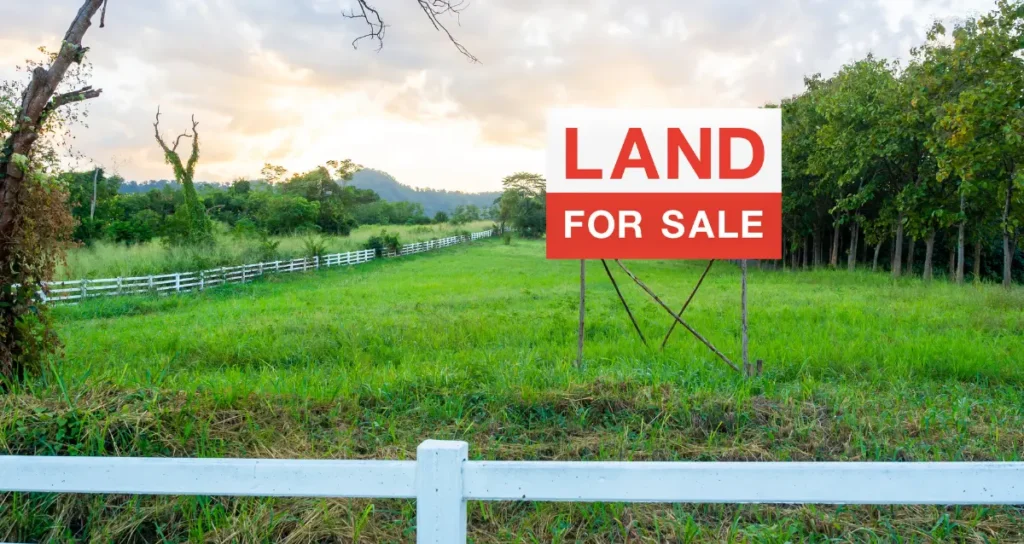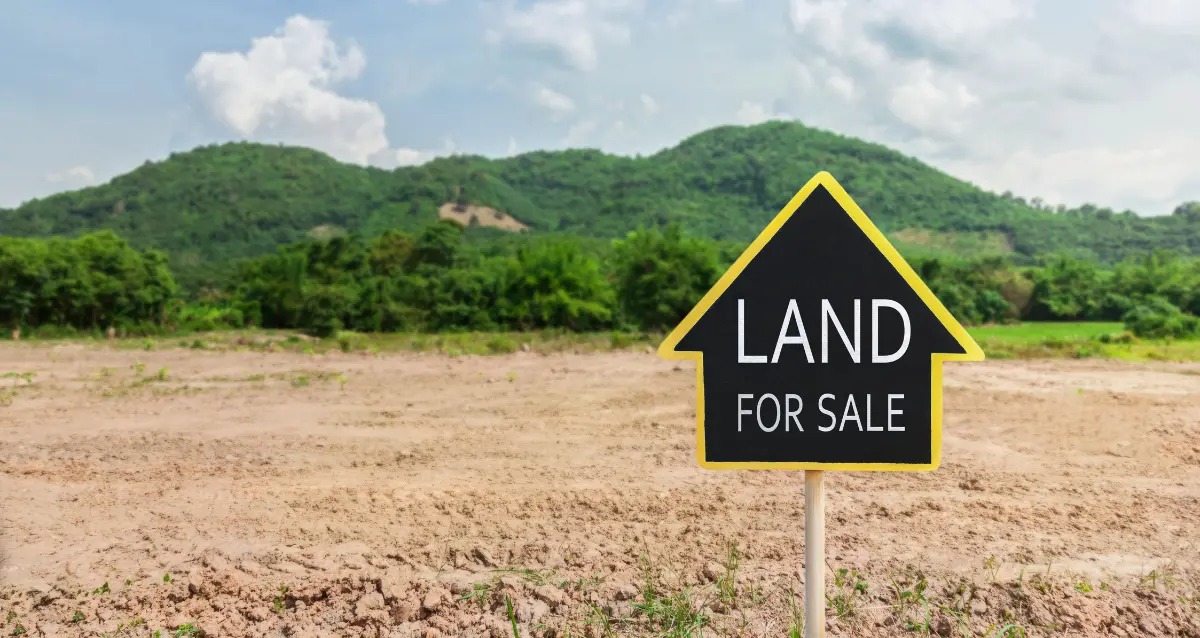Essential Questions to Ask When Buying Land
Buying land can be an exciting and rewarding venture, but it also comes with unique challenges and considerations. Unlike purchasing a pre-existing property, acquiring land requires a thorough understanding of various factors that can impact its value, usability, and potential.
To ensure a successful land purchase, it’s crucial to ask the right questions and conduct comprehensive due diligence. In this article, we’ll explore 13 essential questions that every prospective land buyer should ask before making a commitment.
29 Essential Questions to Ask When Buying Land to ensure a well-informed decision:
Understanding the Intended Use of the Land
- What is your intended use for the land (residential, commercial, agricultural, etc.)?
- Does the land’s zoning align with your intended use?
Residential, Commercial, or Industrial Purposes
- What is the current zoning classification of the land?
- Are there any restrictions on changing the zoning classification?
Zoning Regulations and Potential Changes
- Can the zoning be changed to suit your intended use, and what is the process for doing so?
- What are the costs and potential timeframes involved in seeking a zoning change or variance?
Easements and Access
- Are there any existing easements on the property?
- Do you have legal access to the property?
- Is the property landlocked, and if so, how can access be established?
Land Survey and Boundaries
- Has a recent land survey been conducted?
- What are the exact boundaries of the property?
- Are there any encroachment issues with neighboring properties?
Rights and Interests
- What rights and interests (surface, mineral, water) come with the property?
- Are there any rights retained by the seller or other parties?
Water Features
- Are there any water features on the land (rivers, streams, lakes, ponds)?
- What are the implications of these water features for land use and value?
Environmental Issues
- Are there any known environmental issues or contamination on the property?
- What remediation efforts, if any, will be required?
Utilities and Infrastructure
- Are public utilities (electricity, water, sewage) available on the property?
- What are the costs of bringing utilities to the property if they are not already present?
Current and Neighboring Land Uses
- What is the current use of the land?
- What are the neighboring properties used for, and are there any potential conflicts?
Trails and Roads
- Are there any existing trails or roads on the property?
- What are the costs of creating new access routes if needed?
Potential Government Actions
- Is there a risk of eminent domain or other government actions affecting the land?
- Are there any public projects or initiatives planned that could impact the property?
Additional Considerations
- What are the property taxes and associated fees?
- Are there any deed restrictions or covenants on the property?
- What are the future development plans or zoning changes in the area?
By asking these questions, you can better understand the property’s suitability for your needs and avoid potential legal, financial, and practical issues.
Determining the Purpose
Understanding the Intended Use of the Land
Before embarking on the journey of buying land, it’s essential to have a clear understanding of your intended purpose for the property. Are you looking to build a residential home, start a commercial venture, or engage in agricultural activities? Defining your goals from the outset will help you narrow down your search and ensure that you purchase land that aligns with your specific needs.
Residential, Commercial, or Industrial Purposes
Different land uses are subject to varying zoning regulations and restrictions. For instance, land zoned for residential purposes may not permit commercial or industrial activities, and vice versa. It’s crucial to understand the zoning classification of the land you’re interested in to avoid potential conflicts or legal issues down the line.
Zoning Regulations and Potential Changes
While zoning regulations can be a limiting factor, it’s worth exploring the possibility of seeking zoning changes or variances. Some areas may allow for zoning amendments, provided you meet certain criteria and follow the appropriate processes. However, it’s important to note that zoning changes can be complex and time-consuming, so it’s advisable to carefully weigh the costs and benefits before pursuing this route.
Easements and Access
What are Easements?
An easement is a legal right that allows someone else to use or access a portion of your property for a specific purpose. Easements can take various forms, such as utility easements for power lines or pipelines, or access easements that grant passage through your land to reach another property or public area.
Importance of Legal Access to the Property
One of the most critical aspects of buying land is ensuring that you have legal access to the property. Without proper access, you may find yourself in a situation where you cannot legally enter or use the land you’ve purchased. This issue can arise if the property is landlocked or if there are no existing easements or public roads leading to the land.
Public Access, Easements, or Lack of Access
When evaluating a potential land purchase, it’s essential to determine how access to the property will be achieved. Is there a public road directly adjacent to the land? If not, are there existing easements that grant access through neighboring properties? If there is no legal access, you may need to negotiate with adjacent landowners to establish an easement, which can be a complex and costly process.

Land Survey and Boundaries
Significance of a Land Survey
A land survey is a crucial step in the land-buying process as it establishes the precise boundaries of the property. Without a survey, you may inadvertently encroach on neighboring properties or find that the actual land area is different from what was initially represented.
Establishing Clear Property Boundaries
A professional land surveyor will use various techniques, such as measuring distances, identifying landmarks, and consulting property records, to accurately delineate the boundaries of the land you intend to purchase. This information is typically presented in the form of a detailed survey map or plat.
Avoiding Encroachment Issues
Clear property boundaries are essential for avoiding potential disputes with neighbors over encroachment or trespassing issues. If you plan to construct buildings or other structures on the land, having an accurate survey will ensure that you stay within the legal boundaries and avoid costly legal battles down the line.
Rights and Interests
Understanding Rights and Interests
When buying land, it’s important to understand the concept of “rights and interests.” This term refers to the various rights and entitlements associated with the ownership of the property, which can include surface rights, mineral rights, water rights, and more.
Surface Rights vs. Mineral Rights
In some cases, the seller may retain certain rights, such as mineral rights, even after transferring ownership of the surface land. This means that while you may own the land itself, the seller or another entity could still have the right to extract valuable resources like oil, gas, or minerals from beneath the surface.
Ensuring the Desired Rights are Included
Before finalizing a land purchase, it’s crucial to clarify which rights and interests will be conveyed with the sale. If you have specific plans or goals for the land, such as mining or drilling, you’ll want to ensure that the necessary rights are included in the transaction. Failure to do so could result in limitations on how you can use and develop the property.
Water Features
Identifying Water Features on the Land
Water features, such as rivers, streams, lakes, or ponds, can significantly impact the value and usability of a piece of land. If the property you’re interested in has water features, it’s important to identify them and understand their implications.
Implications of Water Bodies and Watercourses
The presence of water bodies or watercourses can offer both advantages and challenges. On the one hand, they can provide recreational opportunities, enhance the aesthetic appeal of the property, and potentially serve as a source of water for various purposes. However, they may also be subject to specific regulations, easements, or restrictions related to their use or development.
Potential Value and Considerations
In many cases, land with water features can be more valuable than comparable properties without them. However, it’s important to consider factors such as flood risk, water quality, and potential environmental regulations that may affect how you can use or develop the land. Additionally, you’ll want to investigate any existing water rights or permissions associated with the property.

Environmental Issues
Importance of Identifying Environmental Defects
Environmental issues can have a significant impact on the value and usability of a piece of land. Before making a purchase, it’s crucial to identify any potential environmental defects or contamination that could affect the property. Environmental assessment is a must if you are not sure about the environmental defects of the land.
Chemical Spills, Oil Spills, or Other Pollutants
Past or present industrial activities, improper waste disposal, or accidental spills can result in soil or groundwater contamination. Substances like chemicals, oils, or other pollutants can pose health risks and potential liability concerns for the landowner.
Potential Remediation Requirements
If environmental contamination is discovered on the property, you may be required to undertake costly remediation efforts to address the issue before the land can be safely used or developed. It’s important to factor in these potential costs and liabilities when evaluating a land purchase.
Utilities and Infrastructure
Availability of Public Utilities
When buying land, it’s important to consider the availability of public utilities such as electricity, water, and sewage services. These utilities are essential for most development and construction projects, as well as for basic living needs if you plan to build a residential property on the land.
Cost Implications of Bringing Utilities to the Property
If the land you’re interested in is located in a remote area without existing utility connections, you’ll need to factor in the costs of bringing these services to the property. Depending on the distance and terrain, the expenses associated with running new utility lines or installing wells and septic systems can be substantial.
Importance of Proximity to Infrastructure
In addition to utilities, it’s also important to consider the proximity of the land to other infrastructure, such as roads, highways, and transportation networks. Easy access to these amenities can significantly impact the value and usability of the property, as well as the potential for future development or resale.
Current and Neighboring Land Uses
Understanding the Current Use of the Land
Before making a purchase, it’s essential to understand how the land is currently being used. Is it undeveloped and untouched, or has it been used for agricultural, industrial, or other purposes? The current use can provide valuable insights into the condition of the land, potential environmental concerns, and any existing structures or improvements.
Evaluating Neighboring Land Uses
In addition to the land itself, it’s crucial to evaluate the surrounding properties and their uses. The activities of neighboring landowners can significantly impact your intended use of the property. For example, if you plan to build a residential home, you may want to avoid purchasing land adjacent to an industrial site or a noisy commercial operation.
Potential Conflicts or Compatibility Issues
By understanding the current and neighboring land uses, you can better assess the potential for conflicts or compatibility issues. This knowledge can help you make an informed decision about whether the property is suitable for your needs or if you should explore alternative options.

Trails and Roads
Existing Trails and Roads on the Property
If you’re considering purchasing a large parcel of land, it’s important to determine if there are any existing trails or roads that traverse the property. These access routes can be invaluable for navigating the land, particularly if you plan to use it for recreational or agricultural purposes.
Accessibility and Ease of Movement
Well-maintained trails and roads can significantly improve accessibility and ease of movement within the property. This can be especially important if you plan to develop portions of the land or if you need to transport equipment or materials to different areas.
Cost Implications of Creating New Access Routes
If the land does not have any existing access routes, you’ll need to factor in the costs of creating new trails or roads. Depending on the size of the property, terrain, and desired level of access, these costs can vary widely. It’s essential to consider these expenses as part of your overall budget and land development plans.
Potential Government Actions
Eminent Domain and its Implications
Eminent domain is a legal principle that allows government entities to acquire private property for public use, provided that just compensation is provided to the landowner. While relatively rare, the potential for eminent domain actions can impact your ability to use and develop the land as you see fit.
Public Projects or Initiatives Affecting the Land
Government entities may pursue various public projects or initiatives that could affect your land, such as the construction of highways, public utilities, or other infrastructure. It’s important to research any planned or proposed projects in the area that could potentially impact the property you’re considering.
Understanding Potential Risks and Mitigations
If there is a risk of eminent domain or other government actions affecting the land, it’s crucial to understand the potential implications and any available mitigations. This may involve consulting with legal professionals, participating in public hearings, or exploring alternative land options.
Additional Considerations
Property Taxes and Fees
Owning land often comes with ongoing costs, such as property taxes and fees. Before making a purchase, it’s essential to research and understand the applicable tax rates and any additional fees or assessments that may be associated with the property.
Deed Restrictions or Covenants
Some properties may be subject to deed restrictions or covenants that limit or regulate certain activities or developments on the land. These restrictions can range from architectural guidelines to limitations on commercial or industrial activities. It’s important to review and understand any existing deed restrictions or covenants before finalizing a land purchase.
Future Development Plans in the Area
While current land uses and zoning regulations are important considerations, it’s also wise to research any future development plans or zoning changes that could potentially impact the area surrounding the property you’re interested in. These changes could affect the value, desirability, and overall suitability of the land for your intended purposes.
Conclusion
Buying land can be a complex and multifaceted process, but by asking the right questions and conducting thorough due diligence, you can increase your chances of making a successful and informed purchase. From understanding zoning regulations and easements to evaluating environmental concerns and potential government actions, each aspect of the land acquisition process requires careful consideration.
Remember, the questions outlined in this article are not exhaustive, and you may encounter additional factors specific to your location or intended use of the land. It’s always advisable to consult with professionals, such as real estate agents, lawyers, and land surveyors, to ensure you have a comprehensive understanding of the legal, financial, and logistical implications of your potential land purchase.
By taking the time to ask the right questions and gather all the necessary information, you can make an informed decision and confidently embark on your land ownership journey, whether it’s for residential, commercial, or agricultural purposes.
FAQs
Can I change the zoning of the land I purchase?
While it is possible to request a zoning change or variance in some cases, the process can be complex and time-consuming. It’s generally advisable to purchase land that is already zoned for your intended use to avoid potential delays or complications.
What happens if the land I purchase has an existing easement?
If the land you purchase has an existing easement, you will need to respect the rights granted under that easement. This may involve allowing access to the easement holder or accommodating specific uses or activities on a portion of your property.
How do I determine if there are any environmental issues with the land?
Conducting environmental assessments, such as Phase I and Phase II Environmental Site Assessments, can help identify potential environmental concerns or contamination on the land. These assessments are typically performed by qualified environmental professionals.
Is it necessary to hire a land surveyor before purchasing land?
While not always required, hiring a licensed land surveyor to conduct a thorough survey is highly recommended, especially if you plan to develop or build on the land. A survey can help establish clear property boundaries and identify any potential encroachment issues.
What should I do if I discover potential government actions that could affect the land?
If you become aware of potential government actions, such as eminent domain or public projects that could impact the land, it’s important to consult with legal professionals and local authorities to understand your rights and options. You may also want to consider alternative land options or negotiate appropriate compensation if the actions move forward.
FURTHER READING







